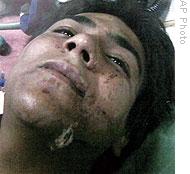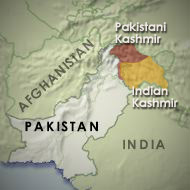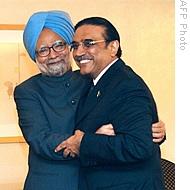voa标准英语2008-Motivation for Mumbai Attacks Murky
搜索关注在线英语听力室公众号:tingroom,领取免费英语资料大礼包。
(单词翻译)
The terrorist attack that left more than 170 people dead in the Indian city of Mumbai remains1 shrouded2 in mystery. Charges, countercharges, and sketchy3 and sometimes contradictory4 information have contributed to confusion about the attack. As VOA correspondent Gary Thomas reports, the most pressing questions about the attack are: who and why?The original claim of responsibility came from an unknown group calling itself the Deccan Mujahedin. But Indian security officials have linked the attack to a group of Islamic radicals5 called Lashkar-e-Taiba, or LET, and, by extension, to Pakistan.
 |
| An image released on Dec. 1, 2008 of Ajmal Qasab who police say was one of the attackers captured during attacks in Mumbai |
The LET has denied responsibility for the Mumbai attack. India has so far offered no solid evidence of Lashkar-e-Taiba involvement outside of what it said was gleaned6 from interrogating7 the sole surviving gunman. But as one senior U.S. intelligence official, whose position requires him to remain anonymous8, put it, "There's not a whole lot that points to anyone else."
At least into the 1990s, Lashkar-e-Taiba - which means "army of the pure" in Urdu - was funded and trained by Pakistan's Inter-Services Intelligence directorate for a proxy9 war against Indian troops in Indian-controlled Kashmir. It has been blamed for a series of attacks, including the 2001 attack on the Parliament in New Delhi, which brought Pakistan and India to brink10 of open conflict.
After that attack, Pakistan's then-president, Pervez Musharraf, banned the LET. But Robert Grenier, a former CIA counterterrorism chief with experience in Pakistan, said Islamabad made no real effort to quash the group.
"Pakistani support certainly has lessened11. But my strong suspicion, shared by others, that the Pakistanis have balked12 at really trying to take these organizations apart in a serious way, number one, because they're concerned about domestic backlash, and, number two, in the back of their minds they're thinking, 'You know, at some point we may have to really reconsider this policy," he said.
If the well-planned, sophisticated attack was carried out by Lashkar-e-Taiba, the question arises: Does Pakistan control the group or was it operating independently?
Christine Fair, an analyst13 with the RAND Corporation in Washington, said there is little doubt in her mind that Lashkar-e-Taiba still answers to the Pakistani intelligence service. "They're an ISI asset. So the big question is not why did Lashkar do this, but, 'Why did the ISI order it,'" she asked.
"They're an ISI asset. So the big question is not why did Lashkar do this, but, 'Why did the ISI order it,'" she asked.
Former CIA officer Robert Grenier said the LET may have been worried about the slowly thawing14 relationship between India and Pakistan.
"It potentially brings Kashmir back to the fore15. And it demonstrates to the Pakistani government and the Indian government, for that matter, that they won't stand by and watch a separate peace gain any momentum," he said.
Shaun Gregory, a South Asia terrorism analyst at the University of Bradford in Britain, said some elements in the ISI and the army are wary16 of Pakistani President Asif Ali Zardari as well.
 |
| Indian PM Manmohan Singh (l) hugs Pakistan's President Asif Ali Zardari during a meeting in New York on the sidelines of the United Nations General Assembly meeting, 24 Sep 2008 |
"Now Zardari was talking rather casually17 about nuclear arms control regimes," he said. "He's talking about progress on Kashmir and all those kinds of things. And it's possible that that alarmed some in the military and ISI who want to destabilize this [Indo-Pak] relationship or that they want to destabilize Zardari himself."
Christine Fair said the attack even could have been a signal for the incoming U.S. president, Barack Obama, who during the campaign took a tough line on the issue of terrorist sanctuaries18 on Pakistani soil.
"If you believe that Lashkar did this and that Lashkar is an asset of the ISI, and if you believe that Obama has been signaling a much more strong line on Pakistan, this could have been an opportunity to even break the U.S.-Pakistan alliance," she said.
But Fair said the United States very much needs Islamabad's support to fight terrorist groups along the Afghan border so it would not act against Pakistan, even if its complicity in the Mumbai attacks were proved.
"I think that Pakistan sort of banks on this idea that the U.S. believes that it needs Pakistan more than Pakistan needs it," she said. "So in some sense they may, in fact, just get away with this. I think that's going to be it. I mean, what are we really going to do about this? Nothing. Are we going to cut money off to the Pakistan army? Are we going to cut money off to the civilians19?"
But analysts20 said that without evidence or a full investigation21, all they have to offer now are theories. U.S. Secretary of State Condoleeza Rice has urged Pakistan to cooperate fully22 with the investigation of the Mumbai attack.




